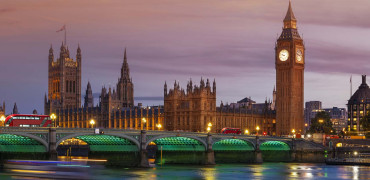Oxford council has taken a series of bold and courageous leadership-giving decisions in its drive to boost the city’s green credentials and achieve net zero carbon emissions targets a full ten years before the national target.
In some headline grabbing measures, the city council will ban gas hobs and boilers in new homes (with very limited exemptions) from 2025, bringing forward the implementation date of an existing policy from 2036, as it plans to hit net zero by 2040 and says this move will help tackle the 'existential threat of climate change’.
Indeed the city of dreaming spires (courtesy of the poet Matthew Arnold) may also be giving communities across the UK a blueprint in how to respond to climate change and the threats that global warming presents to our future ways of living and even our very existence.
The moves by Oxford are bound to provoke a hostile reaction from some quarters, such as property developers, but experts at the Climate Change Committee (the CCC) are being far more positive as they call on the Government to show more leadership on this subject.
And in a surprising coincidence, an international study into the health impacts of gas hobs and ovens has shown there are considerable risks from their emission of nitrogen dioxide levels above those recommended by the World Health Organisation.
The PM’s U-turns will benefit private landlords and adversely affect tenants
Divergent targets and timetables
It was perhaps no surprise that the Home Builders Federation were quick out of the blocks, criticising the council for diverging from the national timetable.
Steve Turner, executive director at the HBF, said: “We need all parties, including central and local government to work together and avoid diverging off the developing plan, which will lead to unnecessary delays and additional costs.”
He added that the industry “is committed” to the Government's plan and is working with stakeholders to deliver it. However, the Government’s own scientific advisors on the CCC are calling on Rishi Sunak to reverse some of his recent decisions.
Back in Oxford, the city council is currently inviting the public to share their views on a new Local Plan 2040. This sets out the council’s plans to require all new developments - including those for housing and businesses - to be net zero in operation and for all developments of 10 or more homes, to provide at least 40% of them as affordable housing.
Those wanting to build new housing will also be required to plant more trees, hedges and other greenery.
Councillor Louise Upton said: “Our Local Plan 2040 aims to find the right balance to help us tackle the housing crisis and climate emergency, support our communities and residents and make Oxford a better place for everyone.”
Eye-catching U-turns
It was of course back in September when the Prime Minister pushed back on many of the Government’s exisiting green targets.
The most eye-catching of these were the ban on new petrol and diesel car sales being delayed by five years to 2035, new energy efficiency standards for privately rented homes were cancelled and about a fifth of all households will be covered by an 'exemption' from ever having to remove gas boilers and replace them with heat pumps.
The Government’s advisors on the Climate Change Committee said these decisions will have made meeting future targets harder through both the direct impacts of reduced policy ambition and through the Government’s indication that it will loosen certain Net Zero policies.
The CCC released an update after reviewing the impact of the U-turns. “On decarbonising buildings, the announced changes will make it more difficult to meet the Government’s sectoral pathway.
“While a 2035 phase-out date for fossil boilers is potentially compatible with Net Zero, the exemption of 20% of households from the phase-out will have an impact on emissions all the way out to 2050 – making Net Zero considerably harder to achieve.
“Most importantly, it creates widespread uncertainty for consumers and supply chains. Although the grant for (individual) heat pumps was increased from £5,000 to £7,500 it has not been accompanied by a larger budget and will, therefore, serve fewer homes.”
Negative impacts
The CCC went on to point out that the cancellation of some Net Zero measures is likely to increase both energy bills and motoring costs for households – households who are already facing increasing impacts from climate change.
In other examples of negative impacts they cite - electric vehicles should be significantly cheaper than petrol and diesel vehicles to own and operate over their lifetimes, so any undermining of their roll-out will ultimately increase costs.
The cancellation of regulations on the private-rented sector will lead to higher household energy bills. The proposed regulations on the private-rented sector would have reduced renters’ energy bills significantly (when the expectation is that energy prices will remain elevated over the next few years), although the lower bills may have been partially offset by rent increases.
Government estimates of the energy savings from the policy indicate that it would have saved tenants of upgraded properties £255 per year under ‘normal’ (e.g. pre-crisis) energy prices. As prices are currently elevated, the effect could be bigger in the near term (e.g. £325 at the current price cap).
The Prime Minister’s U-turns will financially benefit private landlords in the short-term, but they will adversely affect their tenants and motorists.
International research
Further support for Oxford’s trail-blazing plans for removing gas cookers and boilers from homes, has come from an international research study into the dangers of gas hobs and ovens – primarily due to the amount of nitrogen dioxide (NO2) they emit.
The research was commissioned by the non-profit energy efficiency group CLASP and conducted by the Netherlands Organisation for Applied Scientific Research (TNO).
More than half of homes using gas hobs and ovens in the study breached the World Health Organisation recommended maximum levels of nitrogen dioxide (NO2) around once a week. It concluded that gas cookers should be fitted with health warnings, because such appliances can fill a kitchen with air pollution levels that breaks recommended safety levels.
Currently around 54% of British homes cook using gas. Remarkably the researchers found that over the course of a year, one in four British homes would have air that was dirtier inside their homes than it was outside.
At present there are no UK policies to tackle the health risks of gas cooking, with binding limits only applying to outdoor air pollution, under the Air Quality Standards Regulations 2010. The Chief Medical Officer, Professor Sir Chris Whitty, last year also stated how important regulation is to cut pollution from indoor appliances.
Dirty indoor air
A recent opinion poll by Opinium found up to three quarters of respondents (74 per cent) say they would consider getting rid of their gas appliances due to air pollution.
TNO senior scientist, Piet Jacobs, said: “We have measured in our field study that in 25% of the selected British households cooking on gas, the EU NO2 limit value for one hour exposure was exceeded. Where outside levels were below these values.
“Changing to electric cooking, preferably combined with use of well-designed ventilation hoods to reduce exposure to high levels of particulate matter from cooking, can bring these values down to below recommended levels.”
The research also built on previous findings that shows children in homes with a gas cooking appliance have a 20% increased risk of suffering a respiratory illness, such as asthma, according to the WHO.
But Oxford is not alone in its plans to ban gas hobs, as New York is also planning to ban them from 2026. Other towns and cities across the UK may want to follow their lead as it looks like there are clear health and safety benefits from banning gas hobs and ovens, as well as the positive impacts on climate change from reducing carbon emissions.
Patrick Mooney is news editor of Housing Management and Maintenance magazine




